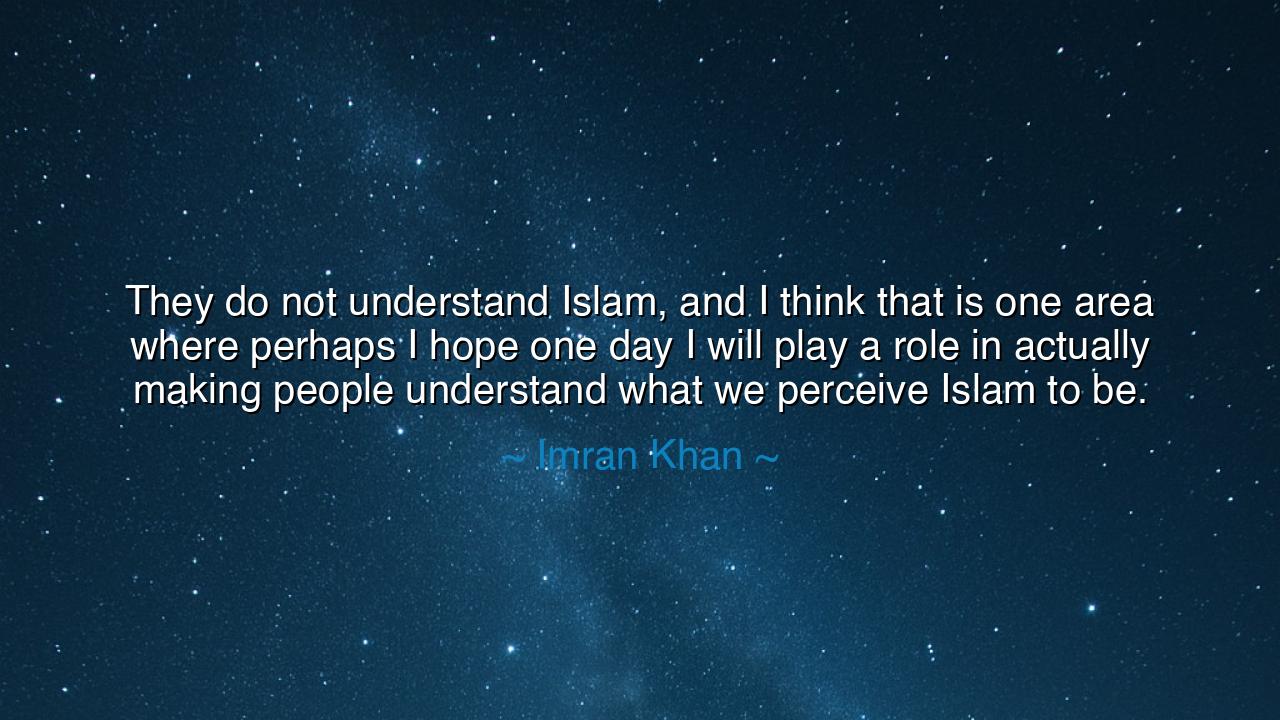
They do not understand Islam, and I think that is one area where
They do not understand Islam, and I think that is one area where perhaps I hope one day I will play a role in actually making people understand what we perceive Islam to be.






“They do not understand Islam, and I think that is one area where perhaps I hope one day I will play a role in actually making people understand what we perceive Islam to be.” Thus spoke Imran Khan, the cricketer turned statesman, a man who has walked through the arenas of glory and the deserts of reflection. In this statement lies not mere political ambition, but a yearning of the spirit—a desire to bridge misunderstanding, to lift the veil of ignorance that clouds the world’s vision of one of the great faiths of humankind. His words echo the lament of prophets and poets alike, who have seen their truths distorted, their faiths reduced to shadows of their essence. Khan speaks here as a man standing between worlds, longing to translate the soul of Islam to those who see only its outer shell.
The origin of these words lies in a time of division, when the name of Islam was burdened by the weight of misunderstanding and fear. In the years following global conflict and extremism, the world’s gaze turned harshly upon Muslims, confusing the actions of a few with the teachings of a faith of over a billion. Khan, educated in the West and born in the East, saw both sides of this divide. He witnessed how the true spirit of Islam—peace, mercy, justice, and dignity—was obscured by politics, by propaganda, and by the reckless deeds of men who claimed to act in its name. His desire was not merely to defend Islam, but to explain it, to reveal its heart to a world that had forgotten how to listen.
To understand his mission, one must first grasp what Islam means in its essence. The word itself springs from “salam,” meaning peace, and from “submission,” not in chains, but in surrender to the will of the Divine—the same Source sought by prophets across time. It teaches not dominance, but harmony between man, nature, and God. Yet throughout history, when faith meets ignorance, it becomes twisted into a weapon. What Khan laments is not new—it is an echo of every age when truth has been veiled by fear. Even Jesus of Nazareth was misunderstood in his time, his message of love contorted into threat by those who feared its power. So too, Khan believes, the message of Islam has been seen through a distorted mirror—its beauty refracted into suspicion, its light mistaken for flame.
Consider, O listener, the life of the Prophet Muhammad (peace be upon him) himself. Before he became the Messenger of God, he was known as Al-Amin, the Trustworthy, beloved even by those who later opposed him. His revolution was not of the sword, but of conscience. He uplifted the oppressed, liberated the enslaved, and declared that the noblest among men were not the wealthy nor the powerful, but the most righteous in conduct. He taught that knowledge was a duty, that compassion outweighed pride, that mercy was stronger than vengeance. Yet even in his lifetime, his message was misunderstood by the mighty of his age, who saw only threat in what was in truth liberation. Imran Khan’s words stand in this same lineage of clarifying truth, calling humanity back to understanding rather than judgment.
There is, too, in his voice the cry of a bridge-builder. For Khan himself was shaped by two worlds—the West that taught him discipline and competition, and the East that taught him faith and humility. He stands as a son of both civilizations, seeking to reconcile them not through power, but through understanding. Like Akbar the Great, who in his time sought to create dialogue among religions, Khan too envisions a world where Islam is not feared but respected, not isolated but recognized as a faith of balance and intellect. In this, he aspires to revive what Muslim scholars once brought to the world: the pursuit of knowledge, compassion, and justice as pillars of divine worship.
Yet his words also carry a warning. “They do not understand,” he says—and in that ignorance lies danger. For misunderstanding breeds fear, and fear breeds hatred. History is filled with the ruins of civilizations that refused to listen to one another, that let prejudice harden their hearts. From the Crusades to the wars of our own century, ignorance has been the mother of bloodshed. But where ignorance destroys, understanding heals. Thus, Khan’s hope—to “play a role” in fostering comprehension—is not a mere wish of reputation, but an act of healing. He seeks not only to defend Islam from distortion, but to defend the world from the blindness that divides it.
So, O children of the future, take this lesson to heart: seek understanding before judgment. In your dealings with others—whether in faith, in culture, or in thought—do not see through the lens of rumor or fear. Learn, listen, and question. For truth is like a gem—it reveals its brilliance only to those who polish it with patience. Be as Khan aspired to be: a servant of understanding, a voice of bridge-building, a guardian of clarity in an age of noise.
And remember this: the power to change the world begins not in the courts of rulers or the noise of armies, but in the quiet revolution of the mind. When you strive to understand another’s faith, another’s story, another’s pain, you honor the divine within yourself. Thus, let Khan’s words echo within you: make people understand—not by argument, but by example; not by pride, but by compassion. For only through understanding can humanity reclaim its unity, and only through unity can the light of peace rise again over a divided world.






AAdministratorAdministrator
Welcome, honored guests. Please leave a comment, we will respond soon